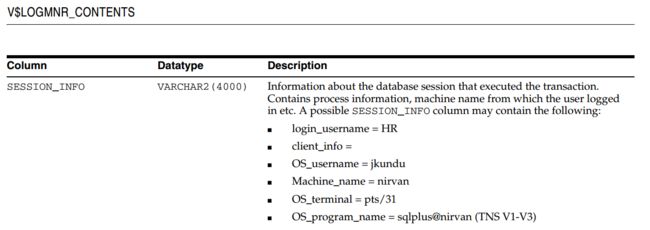- MySQl篇(SQL - 基本介绍)(持续更新迭代)
wclass-zhengge
mysqlsql数据库
目录一、简介二、SQL方言(分页查询为例)1.简介2.SQL方言大比拼2.1.Oracle2.1.1.使用ROWNUM实现分页查询2.1.2.使用ROW_NUMBER()实现分页查询2.2.MySQL2.3.PostgreSQL三、语法规范四、注释五、MySQL脚本中的标点符号一、简介1、SQL是结构化查询语言(StructureQueryLanguage),专门用来操作/访问关系型数据库的通用语
- 梧桐数据库(WuTongDB):数据库技术中都有哪些常见的优化器
鲁鲁517
梧桐数据库梧桐数据库
以下是一些常见的数据库优化器:1.CBO(Cost-BasedOptimizer)应用场景:广泛应用于关系型数据库中,如Oracle、PostgreSQL、MySQL等。工作原理:通过计算不同执行计划的代价(如CPU、I/O等资源消耗),选择最低代价的执行计划。代表数据库:Oracle、PostgreSQL、MySQL。特点:CBO使用统计信息(如表大小、索引分布)来评估查询的代价。2.RBO(R
- 解决mysql漏洞 Oracle MySQL Server远程安全漏洞(CVE-2015-0411)
dieweidong5625
数据库运维java
有时候会检测到服务器有很多漏洞,而大部分漏洞都是由于服务的版本过低的原因,因为官网出现漏洞就会发布新版本来修复这个漏洞,所以一般情况下,我们只需要对相应的软件包进行升级到安全版本即可。通过查阅官网信息,OracleMySQLServer远程安全漏洞(CVE-2015-0411),受影响系统:OracleMySQLServer/usr/databases.sql//先备份原有所有数据,防止数据丢失。
- MySQL内存结构
san.hang
数据库数据结构与算法
实际上MySQL内存的组成和Oracle类似,也可以分为SGA(系统全局区)和PGA(程序缓存区)。mysql>showvariableslike"%buffer%";一、SGA1.innodb_buffer_bool用来缓存Innodb表的数据、索引、插入缓冲、数据字典等信息。2.innodb_log_buffer事务在内存中的缓冲,即redlogbuffer的大小3.querycache高速查
- Oracle(125)如何执行不完全恢复?
辞暮尔尔-烟火年年
Oracleoracle数据库
不完全恢复(IncompleteRecovery)是指将Oracle数据库恢复到一个特定时间点、SCN(系统变更号)或取消点,而不是恢复到最近的备份后的最新状态。以下是详细的步骤和代码示例,展示如何执行不完全恢复。准备工作备份控制文件:确保你有控制文件的备份。备份数据文件:确保你有数据文件的备份。备份归档日志:确保你有最新的归档日志。不完全恢复的基本步骤关闭数据库:确保数据库处于关闭状态。启动数据
- Oracle EBS中AR模块的财务流程概览
六月雨滴
EBSoracle
应收账款(AR)模块是OracleE-BusinessSuite(EBS)中另一个重要的财务管理模块,主要用于管理企业销售过程中的账款回收。下面是AR模块中的一些关键财务流程及其详细说明:1.销售订单管理创建销售订单:当客户下单时,销售人员在系统中创建销售订单。订单确认:确认销售订单的详细信息,包括商品、数量、价格等。订单履行:确保仓库有足够的库存来满足订单需求。2.发票生成发票创建:根据销售订单
- oracle数据库安装和配置详细讲解
程序员小羊!
运维数据库oracle
大家好,我是程序员小羊!前言:Oracle数据库是全球广泛使用的关系型数据库管理系统(RDBMS),提供高性能、可靠性、安全性和可扩展性,广泛应用于企业关键任务系统。下面详细介绍如何在CentOS系统上安装和配置Oracle数据库。1.前提条件1.1硬件要求内存:最小1GB,推荐2GB以上。硬盘:至少10GB的可用空间,视具体应用需求而定。1.2软件要求操作系统:CentOS7或CentOS8(确
- oracle实验-RMAN的PIPE接口
congqingm32098
数据库
RMAN的PIPE接口RMAN除了支持交互式和批处理式,还支持一种PIPE的接口,通过这种PIPE接口,可以在ORACLE中将各种命令发送给RMAN。首先,以PIPE方式启动RMAN,其中P1是管道的名称:F:>RMANPIPEP1TARGET/@TESTNOCATALOG恢复管理器:版本9.2.0.4.0-ProductionCopyright(c)1995,2002,OracleCorpora
- 【网络安全】漏洞挖掘:php代码审计
秋说
网络安全phpweb安全漏洞挖掘
未经许可,不得转载。文章目录正文正文在应用程序中,通过一个JavaScript注释发现了一个备份ZIP文件。解压后,获取了应用程序的代码,其中包含如下代码片段:代码首先检查变量$action是否等于'convert',如果是,则继续执行。随后对传入的变量$data使用trim()函数去除两端空白字符,并使用eval()函数执行$data的内容。显然,代码对$data没有进行任何过滤或验证,因此可以
- 【网络安全 | 代码审计】JFinal之DenyAccessJsp绕过
秋说
网络安全web安全java代码审计漏洞挖掘
未经许可,不得转载。文章目录前言代码审计推理绕过Tomcat解析JSP总结概念验证阐发前言JFinal是一个基于Java的轻量级MVC框架,用于快速构建Web应用程序。它的设计理念是追求极简、灵活、高效,旨在提高开发效率,减少冗余代码的编写,适合中小型项目以及对性能有较高要求的项目。在较新的JFinal版本中,默认情况下无法直接通过浏览器地址栏输入.jsp文件名来访问对应的JSP文件。也就是说,主
- CDGA学习笔记三-《数据安全》
zy_chris
网络安全
七、数据安全7.1引言数据安全包括安全策略和过程的规划、建立与执行,为数据和信息资产提供正确的身份验证、授权、访问和审计。要求来自以下方面:(1)利益相关方(2)政府法规(3)特定业务关注点(4)合法访问需求(5)合同义务7.1.1业务驱动因素1、降低风险信息安全首先对组织数据进行分级分类,对组织数据进行分类分级的整个流程:1)识别敏感数据资产并分类分级2)在企业中查找敏感数据3)确定保护每项资产
- ORACLE查看索引是否有效
清水
索引oracle
SELECTSTATUSFROMUSER_INDEXESWHEREINDEX_NAME='索引名';VALID——索引有效
- Java 学习路线:语言、框架、中间件与数据库
高危型
java
Java是一门功能强大、应用广泛的编程语言,适用于企业级应用、Web开发、大数据处理、Android开发等各种场景。这里为大家介绍了一下我认为较为合适的学习路线一、Java基础1.1Java语言基础1.1.1安装JDK和IDE安装JDK:下载JDK:访问Oracle官网,下载最新的JavaDevelopmentKit(JDK)。安装JDK:按照操作系统要求安装JDK并配置环境变量。Windows上
- 微服务开发实战(七)
禅大师
PostgreSQL下载安装在程序开发中,需要使用到数据库。目前.NETCore支持MSSQLServer,MySQL,PostgreSQL,Oracle等多种数据库。在本教程中,使用的是免费开源、跨平台、功能完善、性能强大的PostgreSQL数据库。可以直接访问官方网站https://www.postgresql.org/下载安装,或者从第三方网站https://www.openscg.com
- Oracle数据库中的Oracle Label Security是什么
2401_85812026
javascript开发语言ecmascript
OracleLabelSecurity(OLS)是Oracle数据库中的一个强大特性,它提供了基于标签的行级安全性控制。通过OLS,组织可以实施细粒度的数据访问控制,确保用户只能访问他们被授权的数据。OracleLabelSecurity的工作原理OLS通过定义一系列的标签和安全策略来控制对数据库中数据的访问。每个数据行都会被分配一个或多个标签,而用户或应用程序的会话也会被分配一个标签。当用户尝试
- 2022-04-25
双髻山府正堂
(1)公务员担任乡级机关、县级机关和设区的市级机关及其有关部门主要领导职务的,应当实行地域回避。法律另有规定的除外。由此可以知道A项违反了地域回避的规定,故A项应选。(2)公务员之间有夫妻关系、直系血亲关系、三代以内旁系血亲关系以及近姻亲关系的,不得在同一机关担任双方直接隶属于同一领导人员的职务或者有直接上下级领导关系的职务,也不得在其中一方担任领导职务的机关从事组织、人事、纪检、监察、审计和财务
- 数据库管理的利器Navicat —— 全面测评与热门产品推荐
界面开发小八哥
数据库Navicat数据库开发sqlmysql
在数据库管理领域,Navicat无疑是一款深受欢迎的软件。作为一个强大的数据库管理和开发工具,它支持多种数据库类型,包括MySQL、MariaDB、MongoDB、SQLServer、Oracle、PostgreSQL等。本文将全面测评Navicat的核心功能,同时推荐几款热门的Navicat产品。Navicat的主要特点1.跨平台支持:Navicat支持Windows、Mac和Linux平台,可
- 通过DBeaver连接Phoenix操作hbase
不想做咸鱼的王富贵
通过DBeaver连接Phoenix操作hbase前言本文介绍常用一种通用数据库工具Dbeaver,DBeaver可通过JDBC连接到数据库,可以支持几乎所有的数据库产品,包括:MySQL、PostgreSQL、MariaDB、SQLite、Oracle、Db2、SQLServer、Sybase、MSAccess、Teradata、Firebird、Derby等等。商业版本更是可以支持各种NoSQ
- PMSJ寻平面设计师之甲骨文公司(Oracle)
全球区块链企业动态
1977年6月.LarryEllison与BobMiner和EdOates在硅谷共同创办了一家名为软件开发实验室(SoftwareDevelopmentLaboratories,SDL)的计算机公司(ORACLE公司的前身).Ellison和Miner预见到数据库软件的巨大潜力.于是.SDL开始策划构建可商用的关系型数据库管理系统(RDBMS).很快他们就弄出来一个产品雏形.或者具体的说.更像一个
- Docker Registry Web:一站式私有Docker Registry管理解决方案
邹澜鹤Gardener
DockerRegistryWeb:一站式私有DockerRegistry管理解决方案项目介绍docker-registry-web是一个专为私有DockerRegistryv2设计的Web界面和安全服务,它提供了浏览仓库、标签和镜像的能力,并具备基于角色的身份验证和审计功能。通过简单的Docker命令,您可以快速启动并开始管理您的Docker镜像。项目技术分析该项目基于Java开发,利用Dock
- 我为什么要写作。
青可可
今天写作2课重新定义写作,收获如下:1、写作是为了改变,改变生活、工作、思维力;2、写作过程是思考的过程,可以采用并列、递进、转折来做深入思考;3、写作需要洞察力,能发现客户的需求,看透事物本质和规律;4、通过写作,把知识演绎的知识变成自己的观点,变成内容的生产者。我想要写作已经很久了。常年从事审计工作,每次写报告都头痛,想学习不知道从何开始,今年开启副业,在007找到写作学习的方法,践行的途径和
- linux安装Oracle所需pdksh包下载
Amor风信子
linuxoracle
linux安装Oracle所需pdksh包下载:pdksh-5.2.14-37.el5.x86_64.rpm的下载提取码:msoe直接安装即可:rpm-ivhpdksh-5.2.14-37.el5.x86_64.rpm如果安装失败则尝试强制安装,强制安装命令:rpm-ivh*****.rpm--nodeps--force例如;rpm-ivhpdksh-5.2.14-37.el5.x86_64.rp
- Spring 源码学习(九) Transaction 事务
带鱼真好吃
spring系列转载自掘金VipAugushttps://juejin.cn/user/2348212565601415/postsSpringTransaction事务的使用和实现原理前言业务系统的数据,一般最后都会落入到数据库中,例如MySQL、Oracle等主流数据库,不可避免的,在数据更新时,有可能会遇到错误,这时需要将之前的数据更新操作撤回,避免错误数据。Spring的声明式事务能帮我们
- Java初级学习路线概要~
艾伦~耶格尔
Java初级java学习开发语言intellij-ideajdk
前言如果你刚刚开始学习Java,掌握基础知识是关键。本文将提供一个详细的Java初级学习路线,帮助各位看官从基础开始,逐步掌握Java编程语言的核心概念。1.Java语言基础1.1Java简介-**Java介绍**:Java是一种广泛使用的编程语言,以其跨平台特性和面向对象设计而著名。-**应用场景**:Web应用、桌面应用、移动应用等。1.2环境搭建**安装JDK**:从[Oracle官网](h
- Oracle分区表之MODIFY 使用在线重定义对集合表进行分区
IT皮特
oracle数据库
您可以使用联机重新定义将未分区的集合表复制到已分区的集合表格,Oracle数据库将行插入集合表格中的相应分区。示例4-41说明了如何对Objects列中的嵌套表执行此操作;类似的例子适用于XMLType表或列中的有序集合类型表。在copy_table_dependents操作期间,您指定0或false用于复制索引和约束,因为您希望保留新定义的集合表的索引和约束。但是,集合表及其分区的名称与临时表的
- Online Conversion of a Non-Partitioned Table to a Partitioned Table in Oracle Database 12c Release 2
IT皮特
数据库oracle
从12.2开始,通过MODIFYTABLE可以在线实现普通表转分区表。一、创建测试表:DROPTABLEt1PURGE;CREATETABLEt1(idNUMBER,descriptionVARCHAR2(50),created_dateDATE,CONSTRAINTt1_pkPRIMARYKEY(id));CREATEINDEXt1_created_date_idxONt1(created_da
- Linux命令行中几个使用history相关的技巧
老率的IT私房菜
当你频繁使用Linux命令行时,有效地使用历史记录可以大大提高生产力。1.使用HISTTIMEFORMAT显示时间戳当在命令行输入history时,它将显示序号和命令。出于审计目的,将时间戳与命令一起显示可能会有所帮助。[root@localhost~]#exportHISTTIMEFORMAT='%F%T'[root@localhost~]#history|less2.使用Ctrl+r搜索历史记
- ‘pip‘ 不是内部或外部命令,也不是可运行的程序或批处理文件。
逆天小北鼻
pythonpip
因为python13不支持pipinstallcx_Oracle,卸载了python13,重新安装python10,导致cmd命令不识别pip,和python10,(;´༎ຶД༎ຶ`)记录一种临时方案如果你的命令行界面(cmd)不识别pip命令,这通常意味着pip的可执行文件路径没有被添加到系统的环境变量中,或者环境变量的设置没有正确生效。重新检查pip的安装路径在命令行中运行以下Python代码
- oracle用户管理
sinat_38878030
第二章Oracle用户管理【目标】1.掌握用户的创建、删除、修改2.掌握基本的权限管理3.了解数据字典及基本操作【内容】一、用户的创建、删除、修改u创建用户语法:createuser用户名identifiedby密码;注:在oracle中创建用户只能由管理员或者具有管理员的权限的用户创建。案例:新建用户abc新建的用户是没有任何权限的,包括连接数据库的权限。新创建的用户是没有任何权限的,直接登录会
- Oracle 用户及角色 介绍
iteye_3158
数据库
一.用户管理1.1建立用户(数据库验证)CREATEUSERDAVEIDENTIFIEDBYpwdDEFAULTTABLESPACEusersTEMPORARYTABLESPACEtempQUOTA5mONusers;1.2修改用户ALTERUSERDAVEQUOTA0ONSYSTEM;1.3删除用户DROPUSERDAVE;DROPUSERDAVECASCADE;1.4显示用户信息SELECT*
- 辗转相处求最大公约数
沐刃青蛟
C++漏洞
无言面对”江东父老“了,接触编程一年了,今天发现还不会辗转相除法求最大公约数。惭愧惭愧!
为此,总结一下以方便日后忘了好查找。
1.输入要比较的两个数a,b
忽略:2.比较大小(因为后面要的是大的数对小的数做%操作)
3.辗转相除(用循环不停的取余,如a%b,直至b=0)
4.最后的a为两数的最大公约数
&
- F5负载均衡会话保持技术及原理技术白皮书
bijian1013
F5负载均衡
一.什么是会话保持? 在大多数电子商务的应用系统或者需要进行用户身份认证的在线系统中,一个客户与服务器经常经过好几次的交互过程才能完成一笔交易或者是一个请求的完成。由于这几次交互过程是密切相关的,服务器在进行这些交互过程的某一个交互步骤时,往往需要了解上一次交互过程的处理结果,或者上几步的交互过程结果,服务器进行下
- Object.equals方法:重载还是覆盖
Cwind
javagenericsoverrideoverload
本文译自StackOverflow上对此问题的讨论。
原问题链接
在阅读Joshua Bloch的《Effective Java(第二版)》第8条“覆盖equals时请遵守通用约定”时对如下论述有疑问:
“不要将equals声明中的Object对象替换为其他的类型。程序员编写出下面这样的equals方法并不鲜见,这会使程序员花上数个小时都搞不清它为什么不能正常工作:”
pu
- 初始线程
15700786134
暑假学习的第一课是讲线程,任务是是界面上的一条线运动起来。
既然是在界面上,那必定得先有一个界面,所以第一步就是,自己的类继承JAVA中的JFrame,在新建的类中写一个界面,代码如下:
public class ShapeFr
- Linux的tcpdump
被触发
tcpdump
用简单的话来定义tcpdump,就是:dump the traffic on a network,根据使用者的定义对网络上的数据包进行截获的包分析工具。 tcpdump可以将网络中传送的数据包的“头”完全截获下来提供分析。它支 持针对网络层、协议、主机、网络或端口的过滤,并提供and、or、not等逻辑语句来帮助你去掉无用的信息。
实用命令实例
默认启动
tcpdump
普通情况下,直
- 安卓程序listview优化后还是卡顿
肆无忌惮_
ListView
最近用eclipse开发一个安卓app,listview使用baseadapter,里面有一个ImageView和两个TextView。使用了Holder内部类进行优化了还是很卡顿。后来发现是图片资源的问题。把一张分辨率高的图片放在了drawable-mdpi文件夹下,当我在每个item中显示,他都要进行缩放,导致很卡顿。解决办法是把这个高分辨率图片放到drawable-xxhdpi下。
&nb
- 扩展easyUI tab控件,添加加载遮罩效果
知了ing
jquery
(function () {
$.extend($.fn.tabs.methods, {
//显示遮罩
loading: function (jq, msg) {
return jq.each(function () {
var panel = $(this).tabs(&
- gradle上传jar到nexus
矮蛋蛋
gradle
原文地址:
https://docs.gradle.org/current/userguide/maven_plugin.html
configurations {
deployerJars
}
dependencies {
deployerJars "org.apache.maven.wagon
- 千万条数据外网导入数据库的解决方案。
alleni123
sqlmysql
从某网上爬了数千万的数据,存在文本中。
然后要导入mysql数据库。
悲剧的是数据库和我存数据的服务器不在一个内网里面。。
ping了一下, 19ms的延迟。
于是下面的代码是没用的。
ps = con.prepareStatement(sql);
ps.setString(1, info.getYear())............;
ps.exec
- JAVA IO InputStreamReader和OutputStreamReader
百合不是茶
JAVA.io操作 字符流
这是第三篇关于java.io的文章了,从开始对io的不了解-->熟悉--->模糊,是这几天来对文件操作中最大的感受,本来自己认为的熟悉了的,刚刚在回想起前面学的好像又不是很清晰了,模糊对我现在或许是最好的鼓励 我会更加的去学 加油!:
JAVA的API提供了另外一种数据保存途径,使用字符流来保存的,字符流只能保存字符形式的流
字节流和字符的难点:a,怎么将读到的数据
- MO、MT解读
bijian1013
GSM
MO= Mobile originate,上行,即用户上发给SP的信息。MT= Mobile Terminate,下行,即SP端下发给用户的信息;
上行:mo提交短信到短信中心下行:mt短信中心向特定的用户转发短信,你的短信是这样的,你所提交的短信,投递的地址是短信中心。短信中心收到你的短信后,存储转发,转发的时候就会根据你填写的接收方号码寻找路由,下发。在彩信领域是一样的道理。下行业务:由SP
- 五个JavaScript基础问题
bijian1013
JavaScriptcallapplythisHoisting
下面是五个关于前端相关的基础问题,但却很能体现JavaScript的基本功底。
问题1:Scope作用范围
考虑下面的代码:
(function() {
var a = b = 5;
})();
console.log(b);
什么会被打印在控制台上?
回答:
上面的代码会打印 5。
&nbs
- 【Thrift二】Thrift Hello World
bit1129
Hello world
本篇,不考虑细节问题和为什么,先照葫芦画瓢写一个Thrift版本的Hello World,了解Thrift RPC服务开发的基本流程
1. 在Intellij中创建一个Maven模块,加入对Thrift的依赖,同时还要加上slf4j依赖,如果不加slf4j依赖,在后面启动Thrift Server时会报错
<dependency>
- 【Avro一】Avro入门
bit1129
入门
本文的目的主要是总结下基于Avro Schema代码生成,然后进行序列化和反序列化开发的基本流程。需要指出的是,Avro并不要求一定得根据Schema文件生成代码,这对于动态类型语言很有用。
1. 添加Maven依赖
<?xml version="1.0" encoding="UTF-8"?>
<proj
- 安装nginx+ngx_lua支持WAF防护功能
ronin47
需要的软件:LuaJIT-2.0.0.tar.gz nginx-1.4.4.tar.gz &nb
- java-5.查找最小的K个元素-使用最大堆
bylijinnan
java
import java.util.Arrays;
import java.util.Random;
public class MinKElement {
/**
* 5.最小的K个元素
* I would like to use MaxHeap.
* using QuickSort is also OK
*/
public static void
- TCP的TIME-WAIT
bylijinnan
socket
原文连接:
http://vincent.bernat.im/en/blog/2014-tcp-time-wait-state-linux.html
以下为对原文的阅读笔记
说明:
主动关闭的一方称为local end,被动关闭的一方称为remote end
本地IP、本地端口、远端IP、远端端口这一“四元组”称为quadruplet,也称为socket
1、TIME_WA
- jquery ajax 序列化表单
coder_xpf
Jquery ajax 序列化
checkbox 如果不设定值,默认选中值为on;设定值之后,选中则为设定的值
<input type="checkbox" name="favor" id="favor" checked="checked"/>
$("#favor&quo
- Apache集群乱码和最高并发控制
cuisuqiang
apachetomcat并发集群乱码
都知道如果使用Http访问,那么在Connector中增加URIEncoding即可,其实使用AJP时也一样,增加useBodyEncodingForURI和URIEncoding即可。
最大连接数也是一样的,增加maxThreads属性即可,如下,配置如下:
<Connector maxThreads="300" port="8019" prot
- websocket
dalan_123
websocket
一、低延迟的客户端-服务器 和 服务器-客户端的连接
很多时候所谓的http的请求、响应的模式,都是客户端加载一个网页,直到用户在进行下一次点击的时候,什么都不会发生。并且所有的http的通信都是客户端控制的,这时候就需要用户的互动或定期轮训的,以便从服务器端加载新的数据。
通常采用的技术比如推送和comet(使用http长连接、无需安装浏览器安装插件的两种方式:基于ajax的长
- 菜鸟分析网络执法官
dcj3sjt126com
网络
最近在论坛上看到很多贴子在讨论网络执法官的问题。菜鸟我正好知道这回事情.人道"人之患好为人师" 手里忍不住,就写点东西吧. 我也很忙.又没有MM,又没有MONEY....晕倒有点跑题.
OK,闲话少说,切如正题. 要了解网络执法官的原理. 就要先了解局域网的通信的原理.
前面我们看到了.在以太网上传输的都是具有以太网头的数据包.
- Android相对布局属性全集
dcj3sjt126com
android
RelativeLayout布局android:layout_marginTop="25dip" //顶部距离android:gravity="left" //空间布局位置android:layout_marginLeft="15dip //距离左边距
// 相对于给定ID控件android:layout_above 将该控件的底部置于给定ID的
- Tomcat内存设置详解
eksliang
jvmtomcattomcat内存设置
Java内存溢出详解
一、常见的Java内存溢出有以下三种:
1. java.lang.OutOfMemoryError: Java heap space ----JVM Heap(堆)溢出JVM在启动的时候会自动设置JVM Heap的值,其初始空间(即-Xms)是物理内存的1/64,最大空间(-Xmx)不可超过物理内存。
可以利用JVM提
- Java6 JVM参数选项
greatwqs
javaHotSpotjvmjvm参数JVM Options
Java 6 JVM参数选项大全(中文版)
作者:Ken Wu
Email:
[email protected]
转载本文档请注明原文链接 http://kenwublog.com/docs/java6-jvm-options-chinese-edition.htm!
本文是基于最新的SUN官方文档Java SE 6 Hotspot VM Opt
- weblogic创建JMC
i5land
weblogicjms
进入 weblogic控制太
1.创建持久化存储
--Services--Persistant Stores--new--Create FileStores--name随便起--target默认--Directory写入在本机建立的文件夹的路径--ok
2.创建JMS服务器
--Services--Messaging--JMS Servers--new--name随便起--Pers
- 基于 DHT 网络的磁力链接和BT种子的搜索引擎架构
justjavac
DHT
上周开发了一个磁力链接和 BT 种子的搜索引擎 {Magnet & Torrent},本文简单介绍一下主要的系统功能和用到的技术。
系统包括几个独立的部分:
使用 Python 的 Scrapy 框架开发的网络爬虫,用来爬取磁力链接和种子;
使用 PHP CI 框架开发的简易网站;
搜索引擎目前直接使用的 MySQL,将来可以考虑使
- sql添加、删除表中的列
macroli
sql
添加没有默认值:alter table Test add BazaarType char(1)
有默认值的添加列:alter table Test add BazaarType char(1) default(0)
删除没有默认值的列:alter table Test drop COLUMN BazaarType
删除有默认值的列:先删除约束(默认值)alter table Test DRO
- PHP中二维数组的排序方法
abc123456789cba
排序二维数组PHP
<?php/*** @package BugFree* @version $Id: FunctionsMain.inc.php,v 1.32 2005/09/24 11:38:37 wwccss Exp $*** Sort an two-dimension array by some level
- hive优化之------控制hive任务中的map数和reduce数
superlxw1234
hivehive优化
一、 控制hive任务中的map数: 1. 通常情况下,作业会通过input的目录产生一个或者多个map任务。 主要的决定因素有: input的文件总个数,input的文件大小,集群设置的文件块大小(目前为128M, 可在hive中通过set dfs.block.size;命令查看到,该参数不能自定义修改);2.
- Spring Boot 1.2.4 发布
wiselyman
spring boot
Spring Boot 1.2.4已于6.4日发布,repo.spring.io and Maven Central可以下载(推荐使用maven或者gradle构建下载)。
这是一个维护版本,包含了一些修复small number of fixes,建议所有的用户升级。
Spring Boot 1.3的第一个里程碑版本将在几天后发布,包含许多
 从上面给出的信息可以看出,可以跟踪到执行sql时对应的用户和主机信息。
从上面给出的信息可以看出,可以跟踪到执行sql时对应的用户和主机信息。